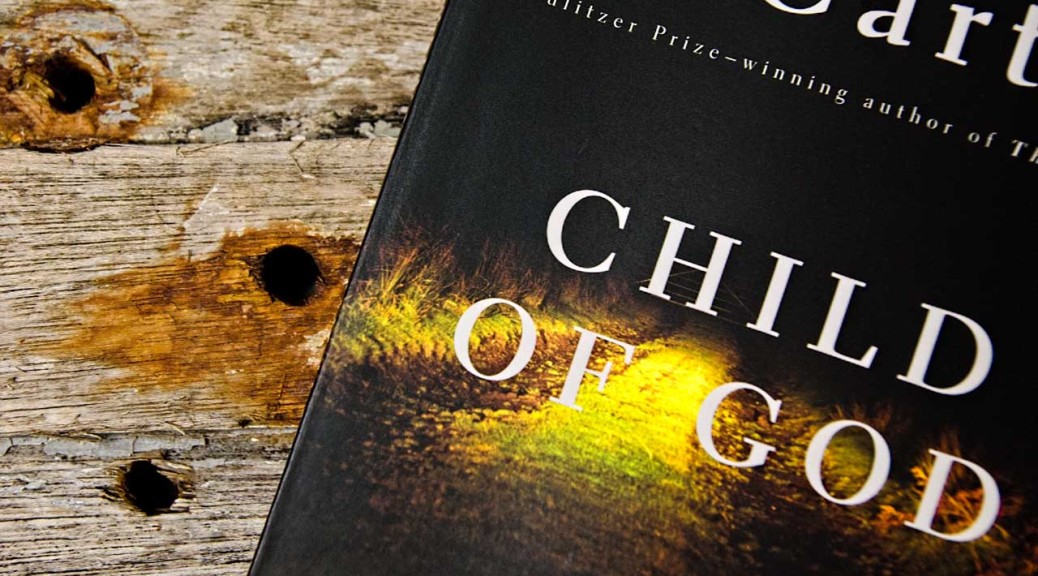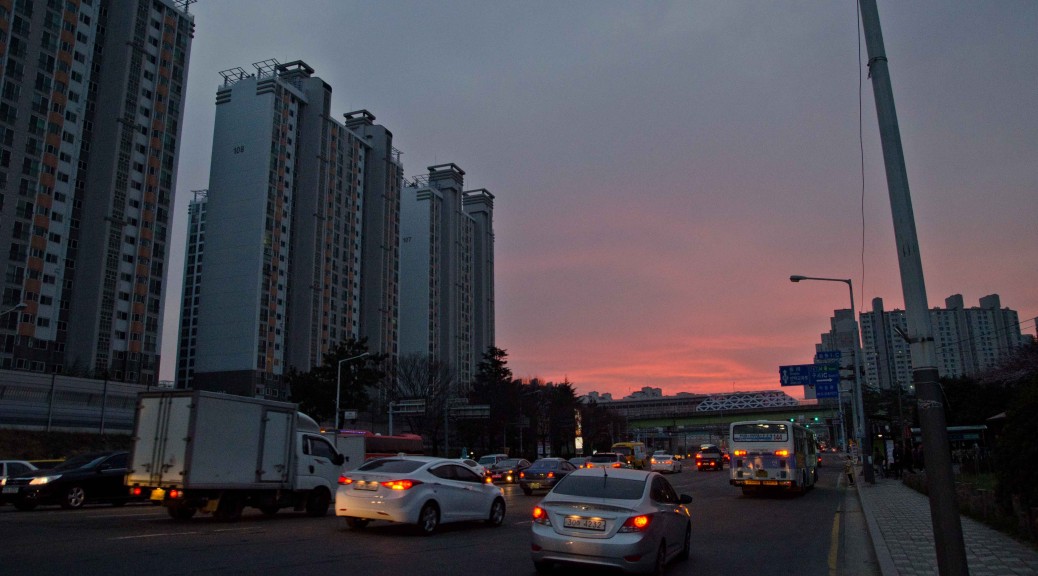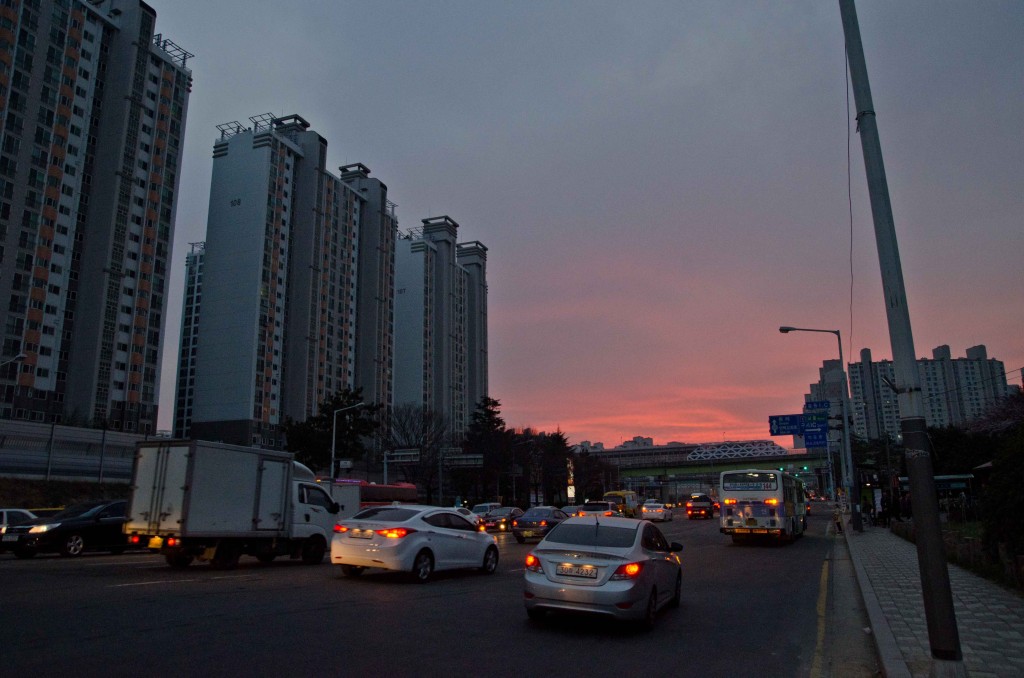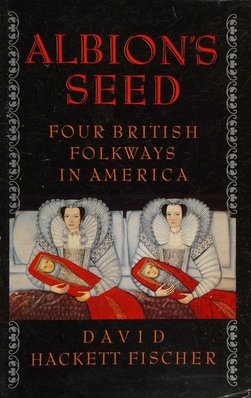McCarthy, Cormac. Child of God. New York, N.Y.: Vintage International. 1993.
(First published 1973)
“He rose and reached and prodded the pale blue underside of the snake with his finger. It shot forward and dropped to the floor with a thud and rifled over the boards like ink running in a gutter and was out the door and gone.” p. 16
“Going up a track of a road through the quarry woods where all about lay enormous blocks and tablets of stone weathered gray and grown with deep green moss, topped monoliths among the trees and vines like traces of an older race of man.” p. 25
“Ballard pointed the rifle at a large mottled tom and said bang. The cat looked at him without interest. It seemed to think him not too bright. Ballard spat on it and it immediately wiped the spittle from its head with a heavy forepaw and set about washing the spot.” p. 26
“Alone in the empty shell of a house the squatter watched through the moteblown glass a rimshard of bonecolored moon come cradling up over the black balsams on the ridge, ink trees a facile hand had sketched against the paler dark of winter heavens.” p. 41
“I’m from Pine Bluff Arkansas and I’m a fugitive from the ways of this world. I’d be a fugitive from my mind if I had me some snow.” p. 53
“All the trouble I ever was in, said Ballard, was caused by whiskey or women or both. He’d often heard men say as much.
All the trouble I ever was in was caused by gettin caught, said the black.” p. 53
“Uptown he walked around in the stores. He went into the postoffice and looked through the sheaves of posters. The wanted stared back with surly eyes. Men of many names. Their tattoos. Legends of dead loves inscribed on perishable flesh. A prevalence of blue panthers.” p. 55
“I’ll say one thing. He could by god shoot it. Hit anything he could see. I seen him shoot a spider out of a web in the top of a big redoak one time and we was far from the tree as from here to the road yonder.” p. 57.
“They was a bunch of us pretty hotshot birdhunters lost our money out there fore we got it figured out. What he was doin, this boy was loadin the old pigeons up the ass with them little firecrackers. They’d take off like they was home free and get up about so high and blam, it’d blow their asses out.” p. 58
“Well, they got us back there and got the gloves on me and all, and this feller that owned the ape, he told me, said: Now don’t hit him too hard out there cause if you do you’ll make him mad and you’ll be in some real trouble. I thought to myself: Well he’s tryin to save his ape a whippin is what he’s tryin to do. Tryin to protect his investment.” p. 59
“The crowd was moving toward the edge of a field and assembling there, Ballard among them, a sea of country people watching into the dark for some midnight contest to begin.” p. 65
“In the bloom of light too you could see two men out in the field crouched over their crate of fireworks like assassins or bridgeblowers.” p. 65
“The hounds’ voices in that vast and pale blue voided echoed like the cries of demon yodelers.” p. 68
“It’s like a lot of things, said the smith. Do the least part of it wrong and ye’d just as well to do it all wrong. He was sorting through handles standing in a barrel. Reckon you could do it now from watchin? he said.
Do what, said Ballard.” p. 74
White caps.
Returning to the car several times. p. 89
“He went outside and looked in through the window at her lying naked before the fire.” p. 92
“The dead girl lay in the other room away from the heat for keeping.” p. 94
“When they had gone from sight in the dry weeks one of them called back something but Ballard could not make it out. He stood in the door where they’d stood and he looked into the room to see could he repeat with his own eyes what they’d seen. Nothing was certain. She lay beneath rags.” p. 94
“She rose slumpshouldered from the floor with her hair all down and began to bump slowly up the ladder. Half-way up she paused, dangling. Then she began to rise again.” p. 95
“The flue howled with the enormity of the draw and red flames danced at the chimney top. An enormous brick candle burning in the night. Ballard crammed brush and pieces of stumpwood right up the chimney throat. He made coffee and leaned back on his pallet. Now freeze, you son of a bitch, he told the night beyond the window-pane.” p. 103
“He woke in the night with some premonition of ill fate. He sat up. The fire had diminished to a single tongue of flame that stood near motionless from the ashes. He lit the map and turned up the wick. A shifting mantle of smoke overhung the room. Thick ribbons of white smoke were seeping down between the boards in the ceiling and he could hear a light crackling noise overhead like something feeding. Oh shit, he said.” p. 104
“When he went back outside he had the bears and the tigers in his arms. The roof was now afire.” p. 105
“His finger filled the cold curve of the trigger. Bang, he said.” p. 109
“Behind the house stood the remains of several cars and from the rear glass of one of them a turkey watched him.” p. 110.
“You ort to be proud, Lester, that you aint’t never married. It is a grief and a heartache and they ain’t no reward in it atall. You just raise enemies in ye own house to grow up and cuss ye.” p. 111.
“The night out there was clear and cold and the moon sat in a great ring in the sky.” p. 118
looking for his empty shell p. 119
“As he whirled about there in the kitchen door the last thing he saw through the smoke was the idiot child. It was watching him, berryeyed filthy and frightless among the painted flames.” p. 120
“He halfway put his hand to the water as if he would touch the face that watched there but then he rose and wiped his mouth and went on through the woods.” p. 127
“At one time in the world there were woods that no one owned and these were like them.” p. 127
“He passed a windfelled tulip poplar on the mountainside that held aloft in the grip of its roots two stones the size of fieldwagons, great tablets on which was writ only a tale of vanished seas with ancient shells in cameo and fishes etched in lime.” p. 127-128
“The shrouded road wound off before him almost lost among the trees and a stream ran beside the road, dark under bowers of ice, small glassfanged caverns beneath tree roots where the water sucked unseen. In the frozen roadside weeds were coiled white ribbons of frost, you’d never figure how they came to be.” p. 128
Selling watches. p. 132.
“The nearer walls of the cavern composed themselves out of the constant night with their pale stone drapery folds and faultline in the vault’s ceiling appeared with a row of dripping limestone teeth. In the black smokehole overhead the remote and lidless stars of the Pleiades burned cold and absolute. p. 133
“Here the walls with their softlooking convolutions, slavered over as they were with wet and bloodred mud, had an organic look to them, like the innards of some great beast. Here in the bowels of the mountain Ballard turned his light on ledges or pallets of stone where dead people lay like saints.” p. 135
“With the advent of this weather bats began to stir from somewhere deep in the cave. Ballard lying on his pallet by the fire one evening saw them come from the dark of the tunnel and ascend through the hole overhead fluttering wildly in the ash and smoke like souls rising from hades.” p. 141
“When they were gone he watched the hordes of cold stars sprawled across the smokehole and wondered what stuff they were made of, or himself.” p. 141
“You put down that rifle and I will.
Any time you feel froggy, jump, said Ballard.” p. 150
“Scuttling down the mountain with the thing on his back he looked like a man beset by some ghost succubus, the dead girl riding him with legs bowed akimbo like a monstrous frog.” p. 153.
“In the dark Ballard passed beneath them, scuttling with his ragged chattel down stone tunnels within the mountain.” p. 154
“Once far downstream he thought he saw toy bears bobbing on the spate but they were lost from sight beyond a stand of trees and he was already nearer the highway than he wished and so turned back.” p. 157
“In the night it had frozen and he came up through a field of grass webbed with little panes of ice and into a wood where the trees were seized in ice each twig like small black bones in glass that cried or shattered in the wind.” p. 158
“Ballard’s shadow veering dark and mutant over the cupped stone walls.” p. 159
“you think people was meaner then than they are now? the deputy said.
The old man was looking out at the flooded town. No, he said. I don’t. I think people are the same from the day God first made one.” p. 168
“Lying awake in the dark of the cave he thought he heard a whistling as he used to when he was a boy in his bed in the dark and he’d hear his father on the road coming home whistling, a lonely piper, but the only sound was the stream where it ran down through the cavern to empty it may be in unknown seas at the center of the earth.” p. 170
“Then the man said: Get up, Lester
Ballard pulled at the bedcovers. I ain’t allowed up, he said… He looked back once at the bed.” p. 178. Ballard at the hospital.
“He heard the mice scurry in the dark. Perhaps they’d nest in his skull, spawn their tiny bald and mewling whelps in the lobed caverns where his brains had been.” p. 189
“At the last seat in the rear a small boy was looking out the window, his nose puttied against the glass. There was nothing out there to see but he was looking anyway.” p. 191
“Ballard saw him from time to time as they were taken out for airing but he had nothing to say to a crazy man and the crazy man had long since gone mute with the enormity of his crimes.The hasp of his metal door was secured with a bent spoon and Ballard once asked if it were the same spoon the crazy man had used to eat the brains with but he got no answer.” p. 193
“As they went down the valley in the new fell dark basking nighthawks rose from the dust in the road before them with wild wings and eyes red as jewels in the headlights.” p. 197



